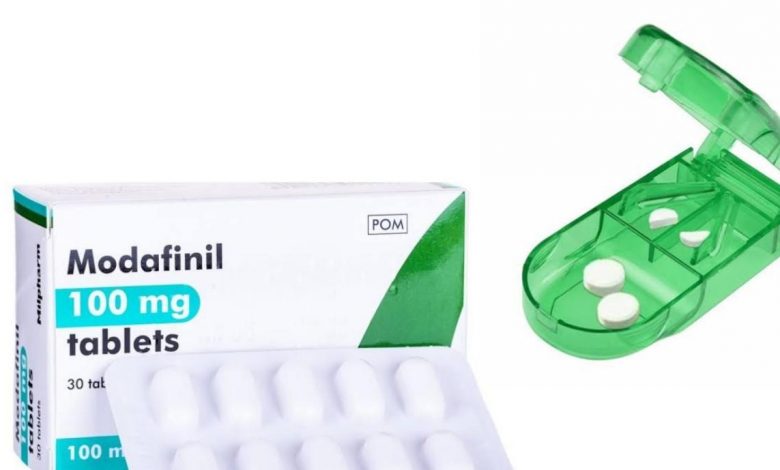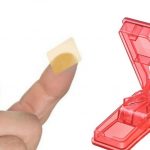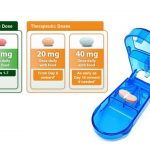Can I Cut Modafinil In Half?

A common question that many people ask their pharmacists is, “can I split my pills?” There are a variety of reasons people want to split their pills. Some people have trouble swallowing tablets that are too big. Others cut pills in half because their healthcare provider wants them to slightly raise or lower their current dose. People also split pills to save money on medication.
Whatever the reason, cutting tablets in half is common. But not all pills can be split. Sometimes, cutting your pill in half can completely change how the medication will work.
What is Modafinil?
Modafinil was originally developed in France by neurophysiologist professor Michel Jouvet and Lafon Laboratories. Modafinil originated with the 1970s invention of a series of benzhydryl sulfinyl compounds, including adrafinil, which was first offered as an experimental treatment for narcolepsy in France in 1986.
Modafinil is used to treat excessive sleepiness caused by narcolepsy (a condition that causes excessive daytime sleepiness) or shift work sleep disorder (sleepiness during scheduled waking hours and difficulty falling asleep or staying asleep during scheduled sleeping hours in people who work at night or on rotating shifts). Modafinil is also used along with breathing devices or other treatments to prevent excessive sleepiness caused by obstructive sleep apnea/hypopnea syndrome (OSAHS; a sleep disorder in which the patient briefly stops breathing or breathes shallowly many times during sleep and therefore doesn’t get enough restful sleep). Modafinil is in a class of medications called wakefulness-promoting agents. It works by changing the amounts of certain natural substances in the area of the brain that controls sleep and wakefulness.
How should Modafinil be used?
Modafinil comes as a tablet to take by mouth. It is usually taken once a day with or without food. If you are taking modafinil to treat narcolepsy or OSAHS, you will probably take it in the morning. If you are taking modafinil to treat shift work sleep disorder, you will probably take it 1 hour before the beginning of your work shift. Take modafinil at the same time every day. Do not change the time of day that you take modafinil without talking to your doctor. Talk to your doctor if your work shift does not begin at the same time every day. Follow the directions on your prescription label carefully, and ask your doctor or pharmacist to explain any part you do not understand. Take modafinil exactly as directed.
Narcolepsy and obstructive sleep apnea: The recommended dose is 200 mg by mouth once daily in the morning.
Shift work disorder: The recommended dose is 200 mg by mouth once daily about 1 hour before the start of a work shift.
Modafinil may be habit-forming. Do not take a larger dose, take it more often, or take it for a longer period of time than prescribed by your doctor.
Modafinil may decrease your sleepiness, but it will not cure your sleep disorder. Continue to take modafinil even if you feel well-rested. Do not stop taking modafinil without talking to your doctor.
Modafinil should not be used in place of getting enough sleep. Follow your doctor’s advice about good sleep habits. Continue to use any breathing devices or other treatments that your doctor has prescribed to treat your condition.
Can I cut modafinil in half?
No, you should not cut, split or crush modafinil tablets. If you’re having trouble taking modafinil, talk to your doctor or pharmacist about options that can make swallowing the tablet easier.
There is no evidence to prove that splitting the dose of modafinil, helps users find the effects of the drug more stable and predictable. The side effects of cutting modafinil 200mg pills bought online can far outweigh the benefits. Do not change the dose or time of day you take modafinil without talking first with your doctor or pharmacist. You may take this medicine with or without food.
Modafinil side effects
Modafinil can cause mild or serious side effects. The following list contains some of the key side effects that may occur while taking modafinil. This list does not include all possible side effects.
For more information on the possible side effects of modafinil, or tips on how to deal with a troubling side effect, talk with your doctor or pharmacist.
More common side effects
The more common side effects of modafinil can include:
• headache
• nausea
• feelings of nervousness
• anxiety
• trouble sleeping
• loss of appetite
• dry mouth
• dizziness
• runny nose
• diarrhea
• upset stomach
• back pain
• chest pain
Some people may also experience less frequent side effects, such as:
• rapid heartbeat
• depression
• constipation
• vertigo
• tremor
• confusion
Serious side effects
Serious side effects from modafinil aren’t common, but they can occur. Call your doctor right away if you have serious side effects. Call 911 if your symptoms feel life-threatening or if you think you’re having a medical emergency. Serious side effects and their symptoms can include the following:
Severe rash
In rare cases, modafinil can cause a severe rash within the first few weeks of taking it. It may occur along with vomiting and fever and may lead to problems with the liver, lungs, kidneys, and heart.
If you develop a rash while taking modafinil, call your doctor right away. If the rash is related to modafinil, you’ll likely need to stop taking the drug.
Serious allergic reaction
Rarely, people who take modafinil may have an allergic reaction. Symptoms can include:
• severe rash or hives
• trouble breathing or swallowing
• swelling of your lips, tongue, or face
• rapid heartbeat
Heart effects
These effects are more likely to happen in people with a heart condition or high blood pressure but can occur in people without heart conditions. Symptoms can include:
• chest pain
• palpitations (pounding heartbeat)
• trouble breathing
• high blood pressure requiring treatment with medication
If you have these side effects, talk to your doctor right away. Your doctor may need to check you for heart conditions or monitor your heart rate and blood pressure.
Mental health effects
Some people who take modafinil can have mood or mental health-related side effects, such as:
• anxiety
• depression
• feelings of nervousness
• confusion
• irritability
In some cases, these side effects can become severe. Although rare, some people have had thoughts of suicide, symptoms of psychosis (such as delusions or hallucinations), mania, and aggression. These side effects are more likely to happen in people who have had mental health problems in the past.
Long-term side effects
Taking modafinil long-term may increase the risk of developing psychological and physical dependence. However, this side effect seems to be rare and may be more likely when the drug is used in high doses, or if it’s misused or abused.
modafinil abuse is not common. It’s more likely to occur in people who have a history of alcohol or drug abuse.
Most people don’t seem to have withdrawal symptoms when stopping treatment with modafinil.
Driving warning
Before you drive while taking modafinil, wait until you know how the drug will affect you. If you feel lightheaded, confused, or sleepy after taking it, don’t drive or use dangerous equipment.
Although modafinil helps reduce sleepiness in people with narcolepsy or other conditions, it may not provide full wakefulness. In addition, modafinil might cause certain side effects, such as dizziness or confusion, that may impair your ability to drive.





